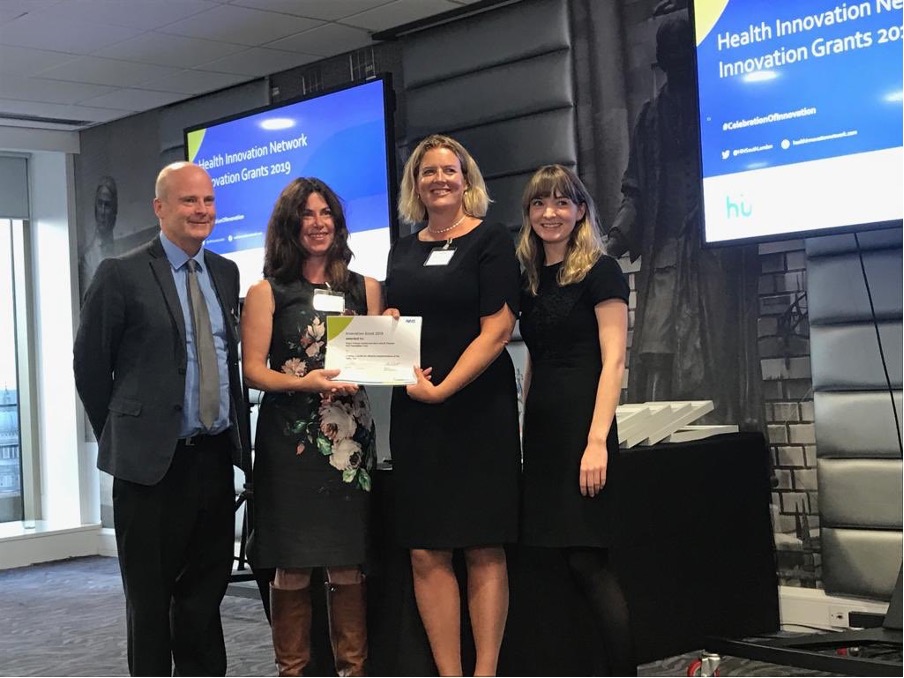Over 18 months after winning a Health Innovation Network (HIN) Innovation Grant, we catch up with Naomi Carlisle, NIHR Clinical Doctoral Research Fellow Department of Women and Children’s Health, King’s College London to tell us about her team’s project and what’s happened since then.
In England and Wales, eight per cent of babies are born premature (before 37 completed weeks of pregnancy). Babies who are born preterm are more likely to be unwell or die.
Often, the first time clinicians can assess risk of preterm birth is when a woman presents to hospital with threatened preterm labour symptoms (such as period-like pain, tightening, or backache). However, threatened preterm labour symptoms are not very good at predicting with women will deliver their baby early. Research tells us that only three to five per cent of women who have symptoms will deliver within seven days.
Therefore, clinicians have to consider the best plan of care, being mindful of the potential consequences of a woman having a preterm birth alongside the risk of overmedicalizing women and offering them unnecessary treatments and interventions.
As a team of clinicians (two obstetricians and a midwife) with specialist preterm birth knowledge, we were aware of the complexities of triaging women in threatened preterm labour. Our aim was to produce a toolkit to promote a best practice pathway for affected women and help accurately predict the risk of preterm birth. This 12-month project begun in September 2019, with the aim of producing a completed toolkit by September 2020.
We decided to apply for a HIN Innovation Grant which would enable us to develop this toolkit. We found the process straightforward. Any questions that we had were quickly answered by the team at the HIN.
The QUiPP app was developed by our group and is available for free. It identifies those who truly need medical intervention, offers reassurance to those who do not and has been shown to reduce unnecessary hospital admissions and transfers.
Six months after starting the project, the first Covid-19 lockdown occurred. Concerns were raised that the pandemic would increase strain on hospital beds and ambulances. As the QUiPP App reduces inappropriate hospital admissions and transfers, interest in the toolkit grew.
Our plans for the toolkit had to be adapted. Luckily our two stakeholder engagement events had already occurred, and we managed to complete our patient and public engagement via email through local Maternity Voice Partnership groups. Due to the increased interest in the toolkit owing to Covid-19, we rapidly rolled out our first version in April 2020 (five months ahead of schedule).
The team at the HIN were invaluable during this process. They put us in touch with their contacts who aided in both the design and hosting of the toolkit. The team also helped disseminate the toolkit on their social media sites. A few months later we updated the toolkit to a second version based on iterative feedback. This second version went live in August 2020 and you can access it for free here.
Since the toolkit has gone live, we have helped over 20 sites across England embed the toolkit. This has included email support, telephone support and delivering online training sessions to aid toolkit implementation The toolkit has been included as part of the West and South West of England PERIPrem care bundle, and it has been recommended by the Pan-London Maternity Clinical Network. Nationally, NHS England recommended the app and toolkit in its Covid-19 update to the Saving Babies Lives Care Bundle and in the British Association of Perinatal Medicine Antenatal Optimisation Toolkit.
We are proud to have developed a toolkit that is now recommended nationally and helps ensure that women and their babies are receiving the best care. Development of this would not have been possible without being awarded the HIN Innovation Grant, and its subsequent advice and support.




